Fleurs du Mal Magazine


Or see the index
Part memoir, part manifesto, the inspiring story of a Louisiana librarian advocating for inclusivity on the front lines of our vicious culture wars.
 One of the things small town librarian Amanda Jones values most about books is how they can affirm a young person’s sense of self. So in 2022, when she caught wind of a local public hearing that would discuss “book content,” she knew what was at stake.
One of the things small town librarian Amanda Jones values most about books is how they can affirm a young person’s sense of self. So in 2022, when she caught wind of a local public hearing that would discuss “book content,” she knew what was at stake.
Schools and libraries nationwide have been bombarded by demands for books with LGTBQ+ references, discussions of racism, and more to be purged from the shelves. Amanda would be damned if her community were to ban stories representing minority groups. She spoke out that night at the meeting. Days later, she woke up to a nightmare that is still ongoing.
Amanda Jones has been called a groomer, a pedo, and a porn-pusher; she has faced death threats and attacks from strangers and friends alike. Her decision to support a collection of books with diverse perspectives made her a target for extremists using book banning campaigns-funded by dark money organizations and advanced by hard right politicians-in a crusade to make America more white, straight, and “Christian.” But Amanda Jones wouldn’t give up without a fight: she sued her harassers for defamation and urged others to join her in the resistance.
Mapping the book banning crisis occurring all across the nation, That Librarian draws the battle lines in the war against equity and inclusion, calling book lovers everywhere to rise in defense of our readers.
Amanda Jones has been an educator for 23 years, at the same middle school she attended as a child. She has served as President of the Louisiana Association of School Librarians and won numerous awards for her work in school libraries, including School Library Journal Librarian of the Year. A sought-after keynote speaker, Amanda is a frequent volunteer for state and national library associations, as well as a co-founder of the Livingston Parish Library Alliance and founding member of Louisiana Citizens Against Censorship. She lives in Livingston Parish, Louisiana.
That Librarian:
The Fight Against Book Banning in America
by Amanda Jones
ISBN: 9781639733538
ISBN-10: 1639733531
Publisher: Bloomsbury Publishing
Publication Date: August 27th, 2024
Pages: 288
Language: English
$29.99
• fleursdumal.nl magazine
More in: - Audiobooks, - Book Lovers, - Book News, - Book Stories, - Bookstores, - Guerilla Libraries, Archive I-J
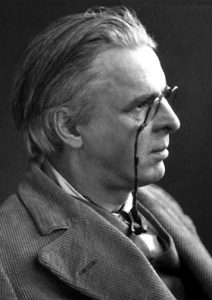
When you are old and grey
When you are old and grey and full of sleep,
And nodding by the fire, take down this book,
And slowly read, and dream of the soft look
Your eyes had once, and of their shadows deep;
How many loved your moments of glad grace,
And loved your beauty with love false or true,
But one man loved the pilgrim soul in you,
And loved the sorrows of your changing face;
And bending down beside the glowing bars,
Murmur, a little sadly, how Love fled
And paced upon the mountains overhead
And hid his face amid a crowd of stars.
W.B. Yeats
(1865—1939)
When you are old and grey
• fleursdumal.nl magazine
More in: Archive Y-Z, Archive Y-Z, Yeats, William Butler
The story of art as it’s never been told before, from the Renaissance to the present day, with more than 300 works of art.
How many women artists do you know? Who makes art history? Did women even work as artists before the twentieth century? And what is the Baroque anyway?
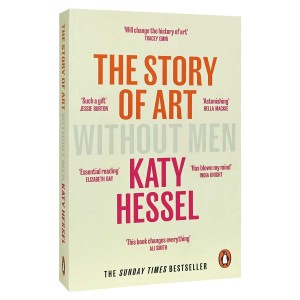 Guided by Katy Hessel, art historian and founder of @thegreatwomenartists, discover the glittering paintings by Sofonisba Anguissola of the Renaissance, the radical work of Harriet Powers in the nineteenth-century United States and the artist who really invented the “readymade.”
Guided by Katy Hessel, art historian and founder of @thegreatwomenartists, discover the glittering paintings by Sofonisba Anguissola of the Renaissance, the radical work of Harriet Powers in the nineteenth-century United States and the artist who really invented the “readymade.”
Explore the Dutch Golden Age, the astonishing work of postwar artists in Latin America, and the women defining art in the 2020s.
Have your sense of art history overturned and your eyes opened to many artforms often ignored or dismissed. From the Cornish coast to Manhattan, Nigeria to Japan, this is the history of art as it’s never been told before.
Katy Hessel is an art historian, broadcaster and curator dedicated to celebrating women artists from all over the world. She runs @thegreatwomenartists Instagram and The Great Women Artists Podcast, where she has interviewed the likes of Tracey Emin, Marina Abramovic and authors Ali Smith and Deborah Levy. Katy has lectured at Tate and National Gallery, presented films for the BBC, and is a Visiting Fellow at Cambridge University. She is a columnist for the Guardian, and the author of The Story of Art without Men – a Sunday Times Bestseller and winner of Waterstones Book of the Year 2022.
Katy Hessel:
The Story of Art without Men
Publisher: W. W. Norton & Company
May 2, 2023
Language: English
Hardcover: 512 pages
ISBN-10: 0393881865
ISBN-13: 978-0393881868
26,28 euro – hardcover
• fleursdumal.nl magazine
More in: #Non-fiction: Archive, - Book News, - Bookstores, Archive G-H, Art & Literature News, FDM Art Gallery, Feminism, The Ideal Woman
In this unconventional and witty history, award-winning writer and broadcaster Alice Loxton delves into Britain’s past, exploring the country through eighteen notable figures at that most formative age – eighteen.
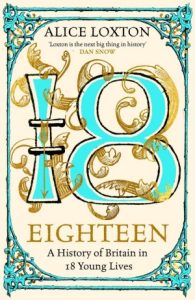 From a young Elizabeth Tudor facing deadly intrigue at court, to Empress Matilda already changing the fate of nations, Eighteen invites readers to join an eclectic cast of young Britons across the nation and throughout its history.
From a young Elizabeth Tudor facing deadly intrigue at court, to Empress Matilda already changing the fate of nations, Eighteen invites readers to join an eclectic cast of young Britons across the nation and throughout its history.
Filled with fascinating stories of royalty, explorers, writers and entertainers, Eighteen asks what lessons we can learn for modern Britain.
Alice Loxton is one of Britain’s most exciting young historians. She has been a pioneer in bringing history to new audiences through social media, and has a total following of over 2 million across Instagram, TikTok and Twitter. She is an experienced writer and presenter, regularly presenting documentaries on History Hit, Channel 4 and the BBC. She is the author of the acclaimed book UPROAR: Scandal, Satire and Printmakers in Georgian London, nominated for Blackwell’s Book of the Year.
Alice Loxton:
Eighteen. A History of Britain in 18 Young Lives
Publisher: Macmillan; Main Market edition
15 Aug. 2024
Language: English
Hardcover: 336 pages
ISBN-10: 1035031280
ISBN-13: 978-1035031283
Reading age: 18 years and up
Dimensions: 15.56 x 3.05 x 23.5 cm
Price: 19,99 euro
• fleursdumal.nl magazine
More in: #Biography Archives, - Book News, - Bookstores, Archive K-L, FDM in London, History of Britain, Tales for Fellow Citizens
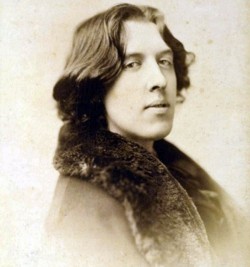
Ballade De Marguerite
(Normande)
I am weary of lying within the chase
When the knights are meeting in market-place.
Nay, go not thou to the red-roofed town
Lest the hoofs of the war-horse tread thee down.
But I would not go where the Squires ride,
I would only walk by my Lady’s side.
Alack! and alack! thou art overbold,
A Forester’s son may not eat off gold.
Will she love me the less that my Father is seen
Each Martinmas day in a doublet green?
Perchance she is sewing at tapestrie,
Spindle and loom are not meet for thee.
Ah, if she is working the arras bright
I might ravel the threads by the fire-light.
Perchance she is hunting of the deer,
How could you follow o’er hill and mere?
Ah, if she is riding with the court,
I might run beside her and wind the morte.
Perchance she is kneeling in St. Denys,
(On her soul may our Lady have gramercy!)
Ah, if she is praying in lone chapelle,
I might swing the censer and ring the bell.
Come in, my son, for you look sae pale,
The father shall fill thee a stoup of ale.
But who are these knights in bright array?
Is it a pageant the rich folks play?
‘T is the King of England from over sea,
Who has come unto visit our fair countrie.
But why does the curfew toll sae low?
And why do the mourners walk a-row?
O ‘t is Hugh of Amiens my sister’s son
Who is lying stark, for his day is done.
Nay, nay, for I see white lilies clear,
It is no strong man who lies on the bier.
O ‘t is old Dame Jeannette that kept the hall,
I knew she would die at the autumn fall.
Dame Jeannette had not that gold-brown hair,
Old Jeannette was not a maiden fair.
O ‘t is none of our kith and none of our kin,
(Her soul may our Lady assoil from sin!)
But I hear the boy’s voice chaunting sweet,
‘Elle est morte, la Marguerite.’
Come in, my son, and lie on the bed,
And let the dead folk bury their dead.
O mother, you know I loved her true:
O mother, hath one grave room for two?
Oscar Wilde
(1854 – 1900)
Ballade De Marguerite
(Normande)
• fleursdumal.nl magazine
More in: Archive W-X, Archive W-X, Wilde, Oscar, Wilde, Oscar
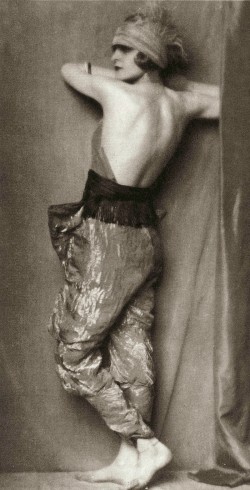
Kokain
Wände
Tisch
Schatten und Katzen
Grüne Augen
Viele Augen
Millionenfache Augen
Das Weib
Nervöses zerflatterndes Begehren
Aufflackerndes Leben
Schwälende Lampe
Tanzender Schatten
Kleiner Schatten
Großer Schatten
Der Schatten
Oh – der Sprung über den Schatten
Er quält dieser Schatten
Er martert dieser Schatten
Er frißt mich dieser Schatten
Was will dieser Schatten
Kokain
Aufschrei
Tiere
Blut
Alkohol
Schmerzen
Viele Schmerzen
Und die Augen
Die Tiere
Die Mäuse
Das Licht
Dieser Schatten
Dieser schrecklich große schwarze Schatten.
Anita Berber
(1899-1928)
Kokain
Anita Berber (1899 – 1928) was a German dancer, actress, and poet. She lived during the time of the Weimar Republic in Berlin.
• fleursdumal.nl magazine
More in: #Editors Choice Archiv, Anita Berber, Anita Berber, Archive A-B, Archive A-B, Berber, Anita, DANCE & PERFORMANCE, FDM in Berlin, Opium-Eaters
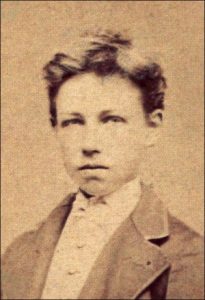
Bannières de mai
Aux branches claires des tilleuls
Meurt un maladif hallali.
Mais des chansons spirituelles
Voltigent parmi les groseilles.
Que notre sang rie en nos veines,
Voici s’enchevêtrer les vignes.
Le ciel est joli comme un ange.
L’azur et l’onde communient.
Je sors. Si un rayon me blesse
Je succomberai sur la mousse.
Qu’on patiente et qu’on s’ennuie
C’est trop simple. Fi de mes peines.
je veux que l’été dramatique
Me lie à son char de fortunes
Que par toi beaucoup, ô Nature,
– Ah moins seul et moins nul ! – je meure.
Au lieu que les Bergers, c’est drôle,
Meurent à peu près par le monde.
Je veux bien que les saisons m’usent.
A toi, Nature, je me rends ;
Et ma faim et toute ma soif.
Et, s’il te plaît, nourris, abreuve.
Rien de rien ne m’illusionne ;
C’est rire aux parents, qu’au soleil,
Mais moi je ne veux rire à rien ;
Et libre soit cette infortune.
Arthur Rimbaud
(1854 – 1891)
Bannières de mai
Derniers vers
• fleursdumal.nl magazine
More in: #Editors Choice Archiv, Archive Q-R, Archive Q-R, Arthur Rimbaud, Rimbaud, Arthur, Rimbaud, Arthur
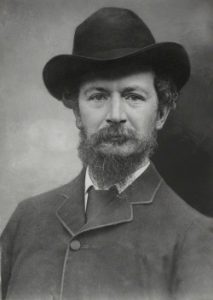
The Complaint of Lisa
(Double Sestina)
Decameron, x. 7
There is no woman living that draws breath
So sad as I, though all things sadden her.
There is not one upon life’s weariest way
Who is weary as I am weary of all but death.
Toward whom I look as looks the sunflower
All day with all his whole soul toward the sun;
While in the sun’s sight I make moan all day,
And all night on my sleepless maiden bed
Weep and call out on death, O Love, and thee,
That thou or he would take me to the dead,
And know not what thing evil I have done
That life should lay such heavy hand on me.
Alas, Love, what is this thou wouldst with me?
What honour shalt thou have to quench my breath,
Or what shall my heart broken profit thee?
O Love, O great god Love, what have I done,
That thou shouldst hunger so after my death?
My heart is harmless as my life’s first day:
Seek out some false fair woman, and plague her
Till her tears even as my tears fill her bed:
I am the least flower in thy flowery way,
But till my time be come that I be dead
Let me live out my flower-time in the sun
Though my leaves shut before the sunflower.
O Love, Love, Love, the kingly sunflower!
Shall he the sun hath looked on look on me,
That live down here in shade, out of the sun,
Here living in the sorrow and shadow of death?
Shall he that feeds his heart full of the day
Care to give mine eyes light, or my lips breath?
Because she loves him shall my lord love her
Who is as a worm in my lord’s kingly way?
I shall not see him or know him alive or dead;
But thou, I know thee, O Love, and pray to thee
That in brief while my brief life-days be done,
And the worm quickly make my marriage-bed.
For underground there is no sleepless bed:
But here since I beheld my sunflower
These eyes have slept not, seeing all night and day
His sunlike eyes, and face fronting the sun.
Wherefore if anywhere be any death,
I would fain find and fold him fast to me,
That I may sleep with the world’s eldest dead,
With her that died seven centuries since, and her
That went last night down the night-wandering way.
For this is sleep indeed, when labour is done,
Without love, without dreams, and without breath,
And without thought, O name unnamed! of thee.
Ah, but, forgetting all things, shall I thee?
Wilt thou not be as now about my bed
There underground as here before the sun?
Shall not thy vision vex me alive and dead,
Thy moving vision without form or breath?
I read long since the bitter tale of her
Who read the tale of Launcelot on a day,
And died, and had no quiet after death,
But was moved ever along a weary way,
Lost with her love in the underworld; ah me,
O my king, O my lordly sunflower,
Would God to me too such a thing were done!
But if such sweet and bitter things be done,
Then, flying from life, I shall not fly from thee.
For in that living world without a sun
Thy vision will lay hold upon me dead,
And meet and mock me, and mar my peace in death.
Yet if being wroth God had such pity on her,
Who was a sinner and foolish in her day,
That even in hell they twain should breathe one breath,
Why should he not in some wise pity me?
So if I sleep not in my soft strait bed
I may look up and see my sunflower
As he the sun, in some divine strange way.
O poor my heart, well knowest thou in what way
This sore sweet evil unto us was done.
For on a holy and a heavy day
I was arisen out of my still small bed
To see the knights tilt, and one said to me
“The king,” and seeing him, somewhat stopped my breath,
And if the girl spake more, I heard not her,
For only I saw what I shall see when dead,
A kingly flower of knights, a sunflower,
That shone against the sunlight like the sun,
And like a fire, O heart, consuming thee,
The fire of love that lights the pyre of death.
Howbeit I shall not die an evil death
Who have loved in such a sad and sinless way,
That this my love, lord, was no shame to thee.
So when mine eyes are shut against the sun,
O my soul’s sun, O the world’s sunflower,
Thou nor no man will quite despise me dead.
And dying I pray with all my low last breath
That thy whole life may be as was that day,
That feast-day that made trothplight death and me,
Giving the world light of thy great deeds done;
And that fair face brightening thy bridal bed,
That God be good as God hath been to her.
That all things goodly and glad remain with her,
All things that make glad life and goodly death;
That as a bee sucks from a sunflower
Honey, when summer draws delighted breath,
Her soul may drink of thy soul in like way,
And love make life a fruitful marriage-bed
Where day may bring forth fruits of joy to day
And night to night till days and nights be dead.
And as she gives light of her love to thee,
Give thou to her the old glory of days long done;
And either give some heat of light to me,
To warm me where I sleep without the sun.
O sunflower made drunken with the sun,
O knight whose lady’s heart draws thine to her,
Great king, glad lover, I have a word to thee.
There is a weed lives out of the sun’s way,
Hid from the heat deep in the meadow’s bed,
That swoons and whitens at the wind’s least breath,
A flower star-shaped, that all a summer day
Will gaze her soul out on the sunflower
For very love till twilight finds her dead.
But the great sunflower heeds not her poor death,
Knows not when all her loving life is done;
And so much knows my lord the king of me.
Aye, all day long he has no eye for me;
With golden eye following the golden sun
From rose-coloured to purple-pillowed bed,
From birthplace to the flame-lit place of death,
From eastern end to western of his way.
So mine eye follows thee, my sunflower,
So the white star-flower turns and yearns to thee,
The sick weak weed, not well alive or dead,
Trod underfoot if any pass by her,
Pale, without colour of summer or summer breath
In the shrunk shuddering petals, that have done
No work but love, and die before the day.
But thou, to-day, to-morrow, and every day,
Be glad and great, O love whose love slays me.
Thy fervent flower made fruitful from the sun
Shall drop its golden seed in the world’s way,
That all men thereof nourished shall praise thee
For grain and flower and fruit of works well done;
Till thy shed seed, O shining sunflower,
Bring forth such growth of the world’s garden-bed
As like the sun shall outlive age and death.
And yet I would thine heart had heed of her
Who loves thee alive; but not till she be dead.
Come, Love, then, quickly, and take her utmost breath.
Song, speak for me who am dumb as are the dead;
From my sad bed of tears I send forth thee,
To fly all day from sun’s birth to sun’s death
Down the sun’s way after the flying sun,
For love of her that gave thee wings and breath,
Ere day be done, to seek the sunflower.
Algernon Charles Swinburne
(1837-1909)
The Complaint of Lisa
(Double Sestina)
Decameron, x. 7
• fleursdumal.nl magazine
More in: # Classic Poetry Archive, Archive S-T, Archive S-T, CLASSIC POETRY, Swinburne, Algernon Charles
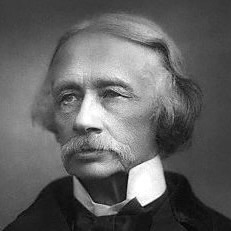
The Revelation
An idle poet, here and there,
Looks round him; but, for all the rest,
The world, unfathomably fair,
Is duller than a witling’s jest.
Love wakes men, once a lifetime each;
They lift their heavy lids, and look;
And, lo, what one sweet page can teach,
They read with joy, then shut the book.
And some give thanks, and some blaspheme
And most forget; but, either way,
That and the Child’s unheeded dream
Is all the light of all their day.
Coventry Patmore
1823–1896
The Revelation
• fleursdumal.nl magazine
More in: # Classic Poetry Archive, Archive O-P, Archive O-P
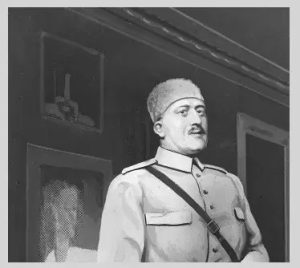
Annie
Sur la côte du Texas
Entre Mobile et Galveston il y a
Un grand jardin tout plein de roses
Il contient aussi une villa
Qui est une grande rose
Une femme se promène souvent
Dans le jardin toute seule
Et quand je passe sur la route bordée de tilleuls
Nous nous regardons
Comme cette femme est mennonite
Ses rosiers et ses vêtements n’ont pas de boutons
Il en manque deux à mon veston
La dame et moi suivons presque le même rite
Guillaume Apollinaire
(1880 – 1918)
Poéme: Annie
Recueil: Alcools (1913)
• fleursdumal.nl magazine
More in: Archive A-B, Archive A-B, DADA, Dada, Dadaïsme, Guillaume Apollinaire

The Garden of Eros
IT is full summer now, the heart of June,
Not yet the sun-burnt reapers are a-stir
Upon the upland meadow where too soon
Rich autumn time, the season’s usurer,
Will lend his hoarded gold to all the trees,
And see his treasure scattered by the wild and spendthrift breeze.
Too soon indeed! yet here the daffodil,
That love-child of the Spring, has lingered on
To vex the rose with jealousy, and still
The harebell spreads her azure pavilion,
And like a strayed and wandering reveller
Abandoned of its brothers, whom long since June’s messenger
The missel-thrush has frighted from the glade,
One pale narcissus loiters fearfully
Close to a shadowy nook, where half afraid
Of their own loveliness some violets lie
That will not look the gold sun in the face
For fear of too much splendour,—ah! methinks it is a place
Which should be trodden by Persephone
When wearied of the flowerless fields of Dis!
Or danced on by the lads of Arcady!
The hidden secret of eternal bliss
Known to the Grecian here a man might find,
Ah! you and I may find it now if Love and Sleep be kind.
There are the flowers which mourning Herakles
Strewed on the tomb of Hylas, columbine,
Its white doves all a-flutter where the breeze
Kissed them too harshly, the small celandine,
That yellow-kirtled chorister of eve,
And lilac lady’s-smock,—but let them bloom alone, and leave
Yon spired holly-hock red-crocketed
To sway its silent chimes, else must the bee,
Its little bellringer, go seek instead
Some other pleasaunce; the anemone
That weeps at daybreak, like a silly girl
Before her love, and hardly lets the butterflies unfurl
Their painted wings beside it,—bid it pine
In pale virginity; the winter snow
Will suit it better than those lips of thine
Whose fires would but scorch it, rather go
And pluck that amorous flower which blooms alone,
Fed by the pander wind with dust of kisses not its own.
The trumpet-mouths of red convolvulus
So dear to maidens, creamy meadow-sweet
Whiter than Juno’s throat and odorous
As all Arabia, hyacinths the feet
Of Huntress Dian would be loth to mar
For any dappled fawn,—pluck these, and those fond flowers which are
Fairer than what Queen Venus trod upon
Beneath the pines of Ida, eucharis,
That morning star which does not dread the sun,
And budding marjoram which but to kiss
Would sweeten Cytheræa’s lips and make
Adonis jealous,—these for thy head,—and for thy girdle take
Yon curving spray of purple clematis
Whose gorgeous dye outflames the Tyrian King,
And fox-gloves with their nodding chalices,
But that one narciss which the startled Spring
Let from her kirtle fall when first she heard
In her own woods the wild tempestuous song of summer’s bird,
Ah! leave it for a subtle memory
Of those sweet tremulous days of rain and sun,
When April laughed between her tears to see
The early primrose with shy footsteps run
From the gnarled oak-tree roots till all the wold,
Spite of its brown and trampled leaves, grew bright with shimmering gold.
Nay, pluck it too, it is not half so sweet
As thou thyself, my soul’s idolatry!
And when thou art a-wearied at thy feet
Shall oxlips weave their brightest tapestry,
For thee the woodbine shall forget its pride
And vail its tangled whorls, and thou shalt walk on daisies pied.
And I will cut a reed by yonder spring
And make the wood-gods jealous, and old Pan
Wonder what young intruder dares to sing
In these still haunts, where never foot of man
Should tread at evening, lest he chance to spy
The marble limbs of Artemis and all her company.
And I will tell thee why the jacinth wears
Such dread embroidery of dolorous moan,
And why the hapless nightingale forbears
To sing her song at noon, but weeps alone
When the fleet swallow sleeps, and rich men feast,
And why the laurel trembles when she sees the lightening east.
And I will sing how sad Proserpina
Unto a grave and gloomy Lord was wed,
And lure the silver-breasted Helena
Back from the lotus meadows of the dead,
So shalt thou see that awful loveliness
For which two mighty Hosts met fearfuly in war’s abyss!
And then I ’ll pipe to thee that Grecian tale
How Cynthia loves the lad Endymion,
And hidden in a grey and misty veil
Hies to the cliffs of Latmos once the Sun
Leaps from his ocean bed in fruitless chase
Of those pale flying feet which fade away in his embrace.
And if my flute can breathe sweet melody,
We may behold Her face who long ago
Dwelt among men by the Ægean sea,
And whose sad house with pillaged portico
And friezeless wall and columns toppled down
Looms o’er the ruins of that fair and violet-cinctured town.
Spirit of Beauty! tarry still a-while,
They are not dead, thine ancient votaries,
Some few there are to whom thy radiant smile
Is better than a thousand victories,
Though all the nobly slain of Waterloo
Rise up in wrath against them! tarry still, there are a few.
Who for thy sake would give their manlihood
And consecrate their being, I at least
Have done so, made thy lips my daily food,
And in thy temples found a goodlier feast
Than this starved age can give me, spite of all
Its new-found creeds so sceptical and so dogmatical.
Here not Cephissos, not Ilissos flows,
The woods of white Colonos are not here,
On our bleak hills the olive never blows,
No simple priest conducts his lowing steer
Up the steep marble way, nor through the town
Do laughing maidens bear to thee the crocus-flowered gown.
Yet tarry! for the boy who loved thee best,
Whose very name should be a memory
To make thee linger, sleeps in silent rest
Beneath the Roman walls, and melody
Still mourns her sweetest lyre, none can play
The lute of Adonais, with his lips Song passed away.
Nay, when Keats died the Muses still had left
One silver voice to sing his threnody,
But ah! too soon of it we were bereft
When on that riven night and stormy sea
Panthea claimed her singer as her own,
And slew the mouth that praised her; since which time we walk alone,
Save for that fiery heart, that morning star
Of re-arisen England, whose clear eye
Saw from our tottering throne and waste of war
The grand Greek limbs of young Democracy
Rise mightily like Hesperus and bring
The great Republic! him at least thy love hath taught to sing,
And he hath been with thee at Thessaly,
And seen white Atalanta fleet of foot
In passionless and fierce virginity
Hunting the tuskéd boar, his honied lute
Hath pierced the cavern of the hollow hill,
And Venus laughs to know one knee will bow before her still.
And he hath kissed the lips of Proserpine,
And sung the Galilæan’s requiem,
That wounded forehead dashed with blood and wine
He hath discrowned, the Ancient Gods in him
Have found their last, most ardent worshipper,
And the new Sign grows grey and dim before its conqueror.
Spirit of Beauty! tarry with us still,
It is not quenched the torch of poesy,
The star that shook above the Eastern hill
Holds unassailed its argent armoury
From all the gathering gloom and fretful fight—
O tarry with us still! for through the long and common night,
Morris, our sweet and simple Chaucer’s child,
Dear heritor of Spenser’s tuneful reed,
With soft and sylvan pipe has oft beguiled
The weary soul of man in troublous need,
And from the far and flowerless fields of ice
Has brought fair flowers meet to make an earthly paradise.
We know them all, Gudrun the strong men’s bride,
Aslaug and Olafson we know them all,
How giant Grettir fought and Sigurd died,
And what enchantment held the king in thrall
When lonely Brynhild wrestled with the powers
That war against all passion, ah! how oft through summer hours,
Long listless summer hours when the noon
Being enamoured of a damask rose
Forgets to journey westward, till the moon
The pale usurper of its tribute grows
From a thin sickle to a silver shield
And chides its loitering car—how oft, in some cool grassy field
Far from the cricket-ground and noisy eight,
At Bagley, where the rustling bluebells come
Almost before the blackbird finds a mate
And overstay the swallow, and the hum
Of many murmuring bees flits through the leaves,
Have I lain poring on the dreamy tales his fancy weaves,
And through their unreal woes and mimic pain
Wept for myself, and so was purified,
And in their simple mirth grew glad again;
For as I sailed upon that pictured tide
The strength and splendour of the storm was mine
Without the storm’s red ruin, for the singer is divine,
The little laugh of water falling down
Is not so musical, the clammy gold
Close hoarded in the tiny waxen town
Has less of sweetness in it, and the old
Half-withered reeds that waved in Arcady
Touched by his lips break forth again to fresher harmony.
Spirit of Beauty tarry yet a-while!
Although the cheating merchants of the mart
With iron roads profane our lovely isle,
And break on whirling wheels the limbs of Art,
Ay! though the crowded factories beget
The blind-worm Ignorance that slays the soul, O tarry yet!
For One at least there is,—He bears his name
From Dante and the seraph Gabriel,—
Whose double laurels burn with deathless flame
To light thine altar; He too loves thee well,
Who saw old Merlin lured in Vivien’s snare,
And the white feet of angels coming down the golden stair,
Loves thee so well, that all the World for him
A gorgeous-coloured vestiture must wear,
And Sorrow take a purple diadem,
Or else be no more Sorrow, and Despair
Gild its own thorns, and Pain, like Adon, be
Even in anguish beautiful;—such is the empery
Which Painters hold, and such the heritage
This gentle solemn Spirit doth possess,
Being a better mirror of his age
In all his pity, love, and weariness,
Than those who can but copy common things,
And leave the Soul unpainted with its mighty questionings.
But they are few, and all romance has flown,
And men can prophesy about the sun,
And lecture on his arrows—how, alone,
Through a waste void the soulless atoms run,
How from each tree its weeping nymph has fled,
And that no more ’mid English reeds a Naïad shows her head.
Methinks these new Actæons boast too soon
That they have spied on beauty; what if we
Have analyzed the rainbow, robbed the moon
Of her most ancient, chastest mystery,
Shall I, the last Endymion, lose all hope
Because rude eyes peer at my mistress through a telescope!
What profit if this scientific age
Burst through our gates with all its retinue
Of modern miracles! Can it assuage
One lover’s breaking heart? what can it do
To make one life more beautiful, one day
More god-like in its period? but now the Age of Clay
Returns in horrid cycle, and the earth
Hath borne again a noisy progeny
Of ignorant Titans, whose ungodly birth
Hurls them against the august hierarchy
Which sat upon Olympus, to the Dust
They have appealed, and to that barren arbiter they must
Repair for judgment, let them, if they can,
From Natural Warfare and insensate Chance,
Create the new Ideal rule for man!
Methinks that was not my inheritance;
For I was nurtured otherwise, my soul
Passes from higher heights of life to a more supreme goal.
Lo! while we spake the earth did turn away
Her visage from the God, and Hecate’s boat
Rose silver-laden, till the jealous day
Blew all its torches out: I did not note
The waning hours, to young Endymions
Time’s palsied fingers count in vain his rosary of suns!—
Mark how the yellow iris wearily
Leans back its throat, as though it would be kissed
By its false chamberer, the dragon-fly,
Who, like a blue vein on a girl’s white wrist,
Sleeps on that snowy primrose of the night,
Which ’gins to flush with crimson shame, and die beneath the light.
Come let us go, against the pallid shield
Of the wan sky the almond blossoms gleam,
The corn-crake nested in the unmown field
Answers its mate, across the misty stream
On fitful wing the startled curlews fly,
And in his sedgy bed the lark, for joy that Day is nigh,
Scatters the pearléd dew from off the grass,
In tremulous ecstasy to greet the sun,
Who soon in gilded panoply will pass
Forth from yon orange-curtained pavilion
Hung in the burning east, see, the red rim
O’ertops the expectant hills! it is the God! for love of him
Already the shrill lark is out of sight,
Flooding with waves of song this silent dell,—
Ah! there is something more in that bird’s flight
Than could be tested in a crucible!—
But the air freshens, let us go,—why soon
The woodmen will be here; how we have lived this night of June!
Oscar Wilde
(1854 – 1900)
The Garden of Eros
• fleursdumal.nl magazine
More in: Archive W-X, Archive W-X, Wilde, Oscar, Wilde, Oscar
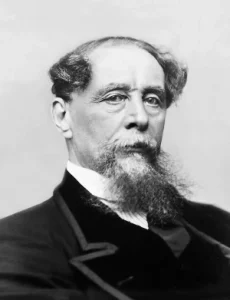
The Song of the Wreck
The wind blew high, the waters raved,
A ship drove on the land,
A hundred human creatures saved
Kneel’d down upon the sand.
Three-score were drown’d, three-score were thrown
Upon the black rocks wild,
And thus among them, left alone,
They found one helpless child.
A seaman rough, to shipwreck bred,
Stood out from all the rest,
And gently laid the lonely head
Upon his honest breast.
And travelling o’er the desert wide
It was a solemn joy,
To see them, ever side by side,
The sailor and the boy.
In famine, sickness, hunger, thirst,
The two were still but one,
Until the strong man droop’d the first
And felt his labours done.
Then to a trusty friend he spake,
“Across the desert wide,
O take this poor boy for my sake!”
And kiss’d the child and died.
Toiling along in weary plight
Through heavy jungle, mire,
These two came later every night
To warm them at the fire.
Until the captain said one day,
“O seaman good and kind,
To save thyself now come away,
And leave the boy behind!”
The child was slumbering near the blaze:
“O captain, let him rest
Until it sinks, when God’s own ways
Shall teach us what is best!”
They watch’d the whiten’d ashy heap,
They touch’d the child in vain;
They did not leave him there asleep,
He never woke again.
Charles Dickens
(1812-1870)
The Song of the Wreck
• fleursdumal.nl magazine
More in: Archive C-D, Archive C-D, Charles Dickens, Dickens, Charles
Thank you for reading Fleurs du Mal - magazine for art & literature